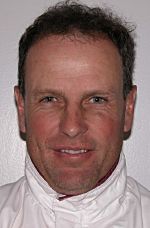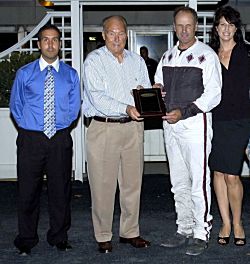A conversation with Ross Wolfenden
May 11, 2011,by Ken Weingartner, Harness Racing Communications
Freehold, NJ — Ross Wolfenden followed his famed father, Peter, into harness racing and eventually moved from his native New Zealand to the U.S., where he has carved out a successful driving career.

Ross Wolfenden
Last year, the 48-year-old Felton, Delaware, resident was the leading driver at Harrington Raceway, giving him his first crown, and was second in the winter standings at Dover Downs. He set a career high with 405 wins overall, which surpassed his previous best of 403 — established just a season earlier.
After he arrived in the U.S., Wolfenden spent several years racing on both coasts. He settled on the East Coast in 1998 and was a fixture in the New Jersey-New York region before moving to Delaware. In 1998, he won the Battle of Freehold with Soulofthematter and a division of the Lady Maud with Confederacy. In 2002 he captured the Blossom with Dear Girl. He has won six Delaware Standardbred Breeders Fund finals.
Lifetime, Wolfenden has won 4,802 races and $43.56 million in purses.
Wolfenden’s father, the winner of more than a dozen premiership driving titles in New Zealand, is perhaps best known for his association with the legendary pacer Cardigan Bay. (In a famous photo he can be seen driving the pacer in the New Zealand Free-For-All at Addington Raceway in Christchurch, with the grandstand on fire in the background.) Peter Wolfenden also represented New Zealand in the World Driving Championships on seven occasions, twice finishing as high as second.
Ross Wolfenden recently took time to discuss his career with Harness Racing Communications’ Ken Weingartner.
HRC: How do you think the year has gone so far?
RW: We ended up third at Dover Downs, which pretty much is an average for me, which I’m happy with. I’m sitting third at Harrington, which is also fairly normal. So far the season has been fine.

Fotowon photos
Harrington COO of racing Jim Boese (second from left) presents the 2010 leading driver award to Ross Wolfenden.
HRC: Last year you were the leading driver at Harrington. That must have been pretty nice.
RW: It’s something nice you can accomplish. That was the first time. I’ve been second and third, but never won it.
HRC: The last two years you’ve topped 400 wins.
RW: Those have been my best seasons.
HRC: Has anything been different compared to other years?
RW: All I can say is a little bit better quality horse. I drive for some good trainers; that helps. At Harrington, a lot of it has to do with the draw on the gate, too. That helps a lot.
HRC: So you’ve gotten a lot of favorable draws the last two years?
RW: (Laughs). I don’t know the average, but it does help.
HRC: How do you like racing in Delaware?
RW: I’ve been here eight years now. I came here just to stop traveling. I live five miles from Harrington and 17 miles from Dover Downs, in between each of them. It was too much traveling up north. I can spend a little bit more time with the family here. And I couldn’t afford land up in Jersey and I ended up buying 10 acres down here. I can fiddle with a couple horses. I don’t have a track so I take them down to Harrington and jog them there and bring them home.
HRC: What do you most enjoy about racing?
RW: It’s the excitement. And if you can win with a little bit of a long shot for somebody, that kind of makes you feel good. Everybody likes to win.
HRC: What’s been the highlight of your career so far?
RW: I haven’t driven any real champion horses, but just seeing all the tracks that I used to read about in New Zealand; I never thought I’d ever be here. My father drove at Vernon Downs in the World Driving Championships and I won with a stakes race up there, and that was nice to have won somewhere in America that my father had been. I remember when I was like 8 years old my dad coming back with a trophy from the World Driving Championships with a ring around it saying ‘Vernon Downs.’ I remember taking that to school for a school project, and then here I am at Vernon Downs. It’s just how life goes. And just coming to a bigger country from New Zealand, just to see everything — it’s so big with so many people. I never thought there would be so many horses.
HRC: How much of an influence was your father?
RW: A big influence. We lived in a suburb and when I turned 18 he bought a 20-acre farm. I wasn’t really into the horses until we moved to the property. He made me and my brother learn a trade before we got into the horses. We both completed our apprenticeships. I was a mechanic and he was a sheet metal fabricator. After that, I made the horses full time. I was 21.
HRC: What brought you to the horses at that point? Was it just the opportunity to be around them more at the farm?
RW: Definitely. I really didn’t know a thing about them until I was 18. I’d go to the races, but I was never involved with them. I’d go with my friends and watch dad race, but never really did much with them.
HRC: Is it hard when your father is so well known and successful?
RW: Yep, because everybody else expects the same. But everyone to me is an individual. You just do the best you can.
HRC: What’s the best thing you learned from your dad?
RW: The care of a horse. As for driving skills, he would just give little bits of advice. Mainly, the driving thing comes from watching so many drivers. If I go to a different track, I’ll watch and see what people do. I think watching other drivers has been a big benefit.
HRC: What led to your decision to come to the States?
RW: It was more action. We only raced one time a week down there. Here, it’s unbelievable. You can race two tracks seven days a week if you want to.
HRC: What was it like when you came to the States?
RW: I was only going to come for six months just to see the place, but I ended up staying the rest of my life. There was no real difficulty along the way. There are so many New Zealanders here and Australians, you’ve got people to help you out. I started driving here in 1993. I went to California in 1996. I had a couple of rough winters in 1994 and 1995 and Paul Jessop, he’s the guy I was working for at the time and got me started driving, I told him I was going back to California and he said to take a couple of horses with me. I did a meet at Los Alamitos in 1996-97 and that’s when I met my wife (Ingrid).
HRC: It looks like 1997 is when things started to turn for you.
RW: That’s when I started to knuckle down more on driving. I was working for Paul Jessop and it was getting to be too much. I had Freehold in the afternoon and Yonkers at night, and then I’d have to get up at 7 and do all the horses. When you’re young you can do it, but when you get older, one track is enough if you want to train horses as well.
HRC: What would you still like to accomplish in the sport?
RW: Five thousand (wins) was kind of a goal, and we’re getting close to it. After I got to 3,000, I wondered if I’d ever make 5,000. Then I guess you’ll hit that and wonder if you’ll ever make 6,000. Accomplishments? It would be nice to own a nice horse. They’re not easy to come by. Even if it was racing somewhere else; maybe someone could train it up in Jersey or something like that. With the 10 acres here, if it ever needed turning out, it would be great to bring him home and spoil him and then send him back.
HRC: What do you like to do when you’re not racing?
RW: I still fiddle with vehicles. I have a little hot rod. And I just work on the farm. It’s a lot of work; a lot of grass to cut. There’s a little park down the road and I take my son (Riley, 11) and go kayaking or bike riding. Another hobby I like is fishing, but you kind of need a whole day to do that. My wife is a good cook and we like to catch striped bass. That’s our favorite fish. Ingrid is a good cook and I miss a lot of the food from New Zealand. She’s got a New Zealand cookbook and pretty much hits it right on the button.
HRC: What type of meals? What is your favorite?
RW: Roast leg of lamb. You can actually buy it from New Zealand and Australia here. Leg of lamb with roast potatoes and all the trimmings.
HRC: What’s your little hot rod?
RW: It’s a ’68 Camaro. It’s got quite a big engine in it. If I have some bad days, I’ll take it for a ride to feel the power. You can get a little steam out of you.
